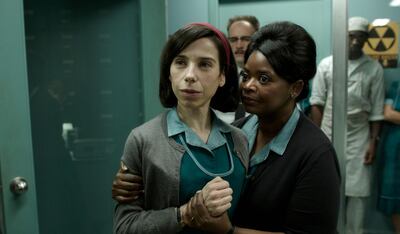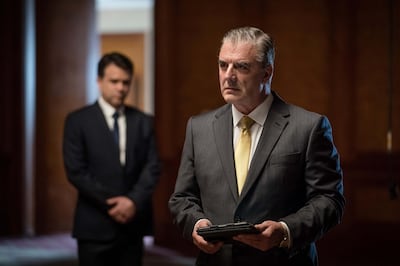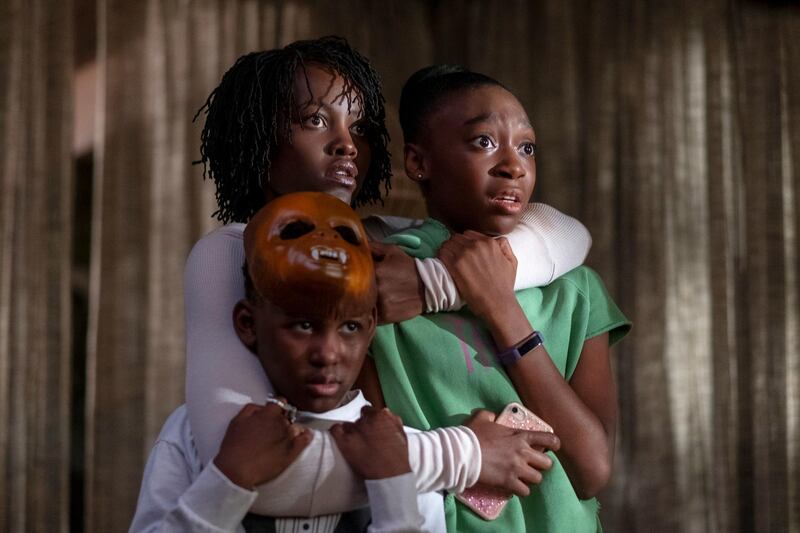In the four years since Donald Trump announced his candidacy for president of the United States, the world's media has struggled to report on his erratic political approach.
Originally, Hollywood lagged behind with its takes on the current political climate. Partly because right up until the night Trump shockingly defeated Hillary Clinton, the industry was hoping his rise would be exposed as a fad, and because it would have also wanted to remain as bipartisan as possible and avoid offending the 62.9 million people who actually voted for him.
Hollywood has been catching up recently, though. Towards the end of 2017, Guillermo del Toro's The Shape of Water was labelled as a critique of Trump's promise to "Make America Great Again," while Steven Spielberg's ode to journalistic integrity, The Post, was littered with parallels to Trump's battle against the media. And after Brexit, Paddington 2 was a powerful reminder of the power of helping and accepting outsiders.

Then films got even more brazen with their political leanings. Sally Potter described her 2017 movie The Party as "a portrait of a UK divided by Brexit", while Armando Iannucci's dialogue in The Death of Stalin was directly inspired by Trump and his administration. A scene in The Leisure Seeker was also set at a Trump rally and Sicario: Day of the Soldado almost entirely unfolded at the Mexican border. Meanwhile, Michael Moore used all of Fahrenheit 11/9 to expose the rise of Trump, The Front Runner argued the Gary Hart scandal fuelled Trump's ascent, and the endings of both Vice and BlacKkKlansman left you in no doubt about their correlations to today.
But any genuine ambitions these films from last year had of changing minds were trumped by the fact that not enough people went to see them. BlacKkKlansman was the highest-grossing film of them, making just $93.3 million (Dh342m) worldwide.

Encouragingly, films released in 2018 and this year show that Hollywood's heavy-hitters have finally entered the debate. While Deadpool 2 did make a rather crude and brutal Jared Kushner joke before then quickly moving on, Captain Marvel's sympathetic depiction of alien refugees being hounded off their own planet by a military force made the Marvel Cinematic Universe's thoughts clear on the refugee crisis and the rise of nationalism in a more resonant and powerful fashion. Most importantly, it grossed $426m domestically and $701.4m internationally. And Marvel hasn't stopped there. Warning: there are a few minor spoilers ahead so if you're yet to see Marvel's latest, skip the next paragraph.
Spider-Man: Far From Home's villain uses fear to ensnarl supporters and relies solely on his hollow charisma to deceive anyone in his way, while he even talks about creating fake news and how "people nowadays will believe anything". At one point, George Orwell's famous quote that has since seemingly become something of a prophecy – "The very concept of objective truth is fading out of the world. Lies will pass into history" – is uttered to really hammer home the sentiment.
Much less surprising than Marvel's first steps into cinema's political discourse was Get Out writer and director Jordan Peele once again using the medium in a fresh, vital and endlessly surprising way to influence audiences with Us. Another smash hit for Peele, Us fell less than $1m short of Get Out's $255m worldwide takings.
But while Get Out ingeniously satirised the centuries-old historical relationship between white and black America, with Us, Peele honed in on the fear of the other, which was used prevalently in both the Trump and Brexit campaigns. Peele has remained tight-lipped on the true meaning of Us, but did say to The Hollywood Reporter at the time of its release, "Think about this as sort of the collective dark side of all of us and, that way, if you're looking at the problems of the world and pointing your finger out, then ask yourself: 'What's my part in it?'"
Even movies that aren't explicitly referencing it can't help but get caught up in the debate over the current political climate. Take Yesterday, which at first, second, or even third glance doesn't appear to be about Brexit. But the parallels to it bubble under the surface.
When The Guardian recently quizzed its director, Danny Boyle, about the film's examination of a "wonderful Britain that might have been", and how Hamish Patel's singer Jack Malik becomes increasingly depressed as he tries to recreate an idyllic version of the country that no one else can remember, his response was simply: "Yeah, well, you could certainly make a case for that."
That's hardly an emphatic endorsement of the theory. But Boyle has been open about just how hard he fought to cast Patel, whose parents moved from Zambia and Kenya before he was born in Cambridgeshire, and, while it might be coincidental, just with his casting, the film silently celebrates the diversity of the United Kingdom.
Television has been just like its big-screen brethren when it comes to political upheaval. The progressive, diverse and female-centric Brooklyn Nine-Nine regularly makes jokes about Trump and his legion of angry fans, and he was even killed off in Unbreakable Kimmy Schmidt's Sliding Van Doors episode, while Broad City was so adamant about not featuring the current president's name that it was bleeped out every time it was uttered. Even the She Knows episode of Big Little Lies had a quip about Trump's many, many bankruptcies.

On the other side of the pond, Brexit continues to play a cameo in many shows. Doctor Who came under fire for having a dig at Brexit and featured a Trump-like character in Arachnids in the UK. We've even already seen an entire dramatisation of Britain's decision to leave the European Union, with Benedict Cumberbatch starring as Dominic Cummings, the campaign director of Vote Leave, in Brexit: The Uncivil War. It is almost a certainty that every major Hollywood studio is already deep into planning their own cinematic takes on Trump and are just trying to think of ways to convince Christian Bale to put on 200 pounds, cover himself in fake tan and wear an awful wig for the leading role.
Time will tell whether or not these hidden messages, overt parallels and entire re-enactments of the current political climate will actually make any kind of positive or even negative impact.
In the meantime, all that shows and movies can do, though, is reflect the state of the world today, and hope that audiences will empathise, learn and start to make it a better place.






